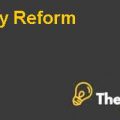
Context and problem description
Technological advancement has revolutionized human activities and operations, and continues to spearhead astronomical changes in virtually every frontier of business. The hospitality industry is no island. It has also had its share of influence of technological development and continues to experience the influence daily. However, there seem to be several challenges that influence how hotels and leisure providers embrace technology.
The uses of technology in the hospitality industry are as momentous as its influences. The advent of e-commerce has seen technology take over all the activities humans use to do physically resulting in efficacy gains that had never been witnessed before. People now prefer to conduct their shopping online, pay using electronic means and have their purchases delivered at their doorsteps. Both businesses and customers get the benefits from technological advancements – customers and business in the hospitality and tourism industry get benefits from advanced reservation systems, communication systems and service provider systems. For instance, technologies facilitate guests and the hotel management/ customer services to constantly communicate and shape the guests’ experience from the time of reservation to the time of checkout.
As technology persists on evolving at a relentless pace, it becomes a challenge for leisure service providers and hotels as well as other players within the hospitality industry to keep up with the challenges and provide the client services that meet their expectations. At the moment 99% of clients in the hospitality industries, travel with at least one electronic device. In this group, 45% carry at least two devices while 40% carry 3 devices or more. Furthermore, clients have a preference for automated services, Wi-Fi connections among others.
The main frontiers of online presence for hospitality companies are advertisement and e-commerce, which have a high potential to expand hotel revenues. Web 2.0 technologies hold enormous potential for advertisement since it has changed the advertisement from being centered around the companies, to allowing clients to share information thus expanding advertisement mechanisms. Incorporating Web 2.0 influences the way clients search for information and can influence potential clients’ decision to visit a hotel or tourist destination (Leung, Lee & Law 2011).
Integrating e-commerce services into a hotel’s website has positive effects on the business's overall strategy. It provides another angle to the marketing mix strategy making it easier to reach customers. This is because today, many consumers spend a lot of time online and thus do most of their shopping online. E-commerce service creates a platform through which clients who shop online for destinations can get information and either book hotel services from the online platforms or directly. The platforms further provide simple ways of effecting payments.
Demand for such services may be influenced by a country’s internet coverage and level accepted towards technology. For instance, in Thailand about 12.8% of the population was using the internet by 2005. The country lags behind its neighbors in the use of the internet. Low internet usage and coverage can have limited effects on the ability of the Thai hospitality industry to adopt and use the Internet in the provision of tourism and hospitality services. Hospitality industry holds the potential to expand employment and attract foreign revenues. To realize this potential, Thai hospitality industry needs to embrace and enhance its use of the Internet. Studies have revealed that the use of Web technologies and the Internet by the Thai hospitality industry is limited to advertising. Few, if any, initiatives are directed towards the provision of a full internet site with a full range of functions including e-commerce features. This means that the industry is unable to reap the benefits and savings that technology can deliver. In regard to these factors, it is necessary to comprehend the inhibiting and the facilitating factors that influence the adoption of web technologies and the internet for marketing and service provision in the Thai hospitality industry. This proposal proposes examination of technological, environmental and organizational factors that influence the adoption of Web technologies such as Web 2.0 and Internet in Thai hospitality industry and the extent of the influence factors exert on the industry.
Literature review
The use of internet and creation of websites has expanded dramatically in various parts of the world. Different countries and institutions within these countries ceaselessly make efforts to enhance their internet services. The base of internet consumers increases daily on the global front. This has made Web technologies such as web 2.0 and the Internet vital as tools of straight marketing and improvement of business on online platforms. Marketers in the hospitality industry take full advantage of these developments and the technologies to capitalize on the opportunities they have to offer. Alisha & Andrew (2003) noted that one in every five hotel bookings was made through the internet. Hotel bookings made online have steadily increased to account for close to a third of revenues generated from hotel bookings. The internet commerce is however mostly concentrated in developed countries. Developing nations still lag a distance behind in the use of web technologies and the internet......................
This is just a sample partial case solution. Please place the order on the website to order your own originally done case solution.












